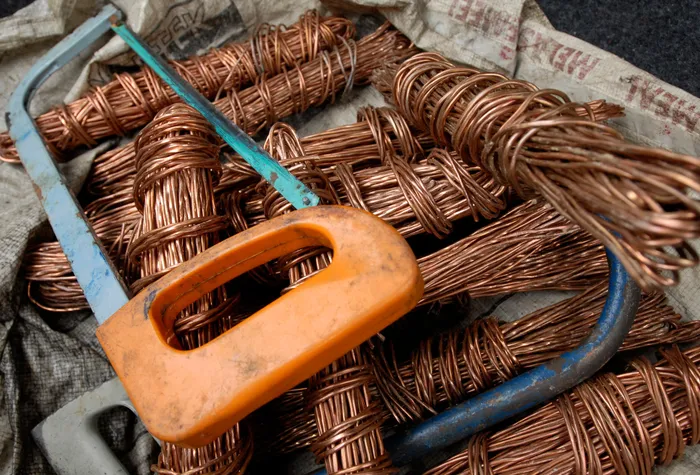Scrap metal ban may not be a panacea for illicit copper trade

Picture: Sam Clark - The 25kg of copper previously found at Helderberg Scrap Metal by the police who arrested two suspects. Government initiatives aimed at curbing crime have not worked says the writer.
By Zelna Jansen
Minister of Trade and Industry Ebrahim Patel noted that an initial estimate has indicated that cable theft was costing the country about R46 billion a year. Cable theft disrupts the signals between trains which causes derailment or collision, leading to loss of life, livelihoods, and other injuries. It also causes power outages which impact the economy. The sentence of 20 years imprisonment and other stringent measures have not been enough to deter the vandalism of infrastructure.
In response to questions in the National Assembly, Public Enterprises Minister Pravin Gordhan stated that to alleviate the risk of continued damage, theft, and vandalism of freight rail infrastructure, the government should consider a temporary ban on the sale of scrap metal. Some MPs are also calling for a complete ban on the sale of copper cables. Stolen copper is usually sold to scrap metal dealers. According to a study, there is massive global demand for scrap metals.
On average 102 million tons were traded globally from 2013 to 2015, at an average value of $77.8 billion (about R1.3 trillion). Some countries are net importers, others, particularly where there are domestic surpluses, are net exporters. South Africa is a net exporter and exported more than R12bn worth of scrap metal to foreign markets in 2015. China has a high demand for metal. Processing scrap metals involves many activities which make the sector labour intensive and is the livelihood for a large pool of informal employees in South Africa, estimated to be between 100 000 to 450 000.
About 10 000 people are directly employed in the formal metal recycling sector.
Scrap metal is regarded as a “controlled good” and its purchase and sale are regulated by the Second Hand Goods Act of 2009, under the supervision of the SAPS. Recycling metal is therefore an integral and lucrative industry. However, because of the high demand for metal, an equally lucrative illicit market has been flourishing to the extent that syndicates have started training schools for newcomers on how to carry out the crime effectively. Should this sector therefore be banned temporarily or completely, and will such a ban reduce cable theft? To answer this question, one must consider what is causing and contributing to the theft. Poverty, unemployment, an ambivalence towards the law and now the high cost of living, can be seen as contributing factors.
Enforcing the law, lack of sufficient resources to enforce the law, overcrowded prisons, and a justice system that many will say is ineffective, are some other factors that allow this crime to flourish. Some believe that if the sale of scrap metal is banned, it will encourage mining for iron and ore, resulting in job creation and diversifying the tax base. This may be true, but if the contributing factors to the crime are not dealt with, it is likely that another form of crime will flourish. Consideration must also be given to the informal and formal workers in the sector. How will they and their dependants be impacted by such a ban? Section 22 of the Constitution provides that “every citizen has the right to choose their trade, occupation, or profession freely”.
“The practice of a trade, occupation or profession may be regulated by law.” If the government can show that a ban would alleviate the crime and is not an arbitrary measure, the right to trade can be limited in terms of section 36 of the Constitution. Such a ban may therefore be constitutional. However, the billion-rand sector, the informal workers, employees, and stakeholders in this value chain will, of course, challenge these measures. They may want to take regulatory measures on review. Further, if the Second Hand Goods Act does not permit the minister to enforce a temporary ban, the Act would have to be amended. In such an event, a bill amending the Act will have to be processed by Parliament and the nine provincial legislatures. That may take about two years. South Africa is also a member and signatory to international and regional agreements. For example, it is a member of the World Trade Organisation and a signatory to the African Continental Free Trade Area. Depending on the commitments made by South Africa in terms of scrap metals, a ban may be in violation of these commitments. Commitments are undertakings that South Africa has made to other countries in an agreement in terms of what it will or will not do to a commodity listed in the agreement. Coming back to the question, should there be a temporary or full ban on the sale of scrap metals?
Clearly, government is frustrated as initiatives aimed at curbing this crime have not worked. Also, the destruction of the country’s infrastructure is viewed by many as an act akin to treason.
Despite all of this, a ban may not solve the problem, but may further drive the sale of scrap metal underground. The crime of cable theft is also not occurring in a vacuum; there are reasons many are committing these crimes. Perhaps if these factors are resolved, it may lead to the crime of cable theft being reduced.
Jansen is a lawyer. She is CEO of Zelna Jansen Consultancy.